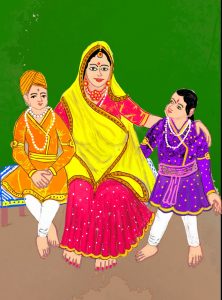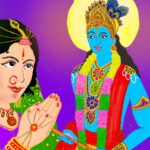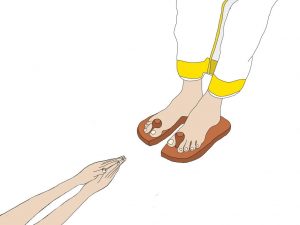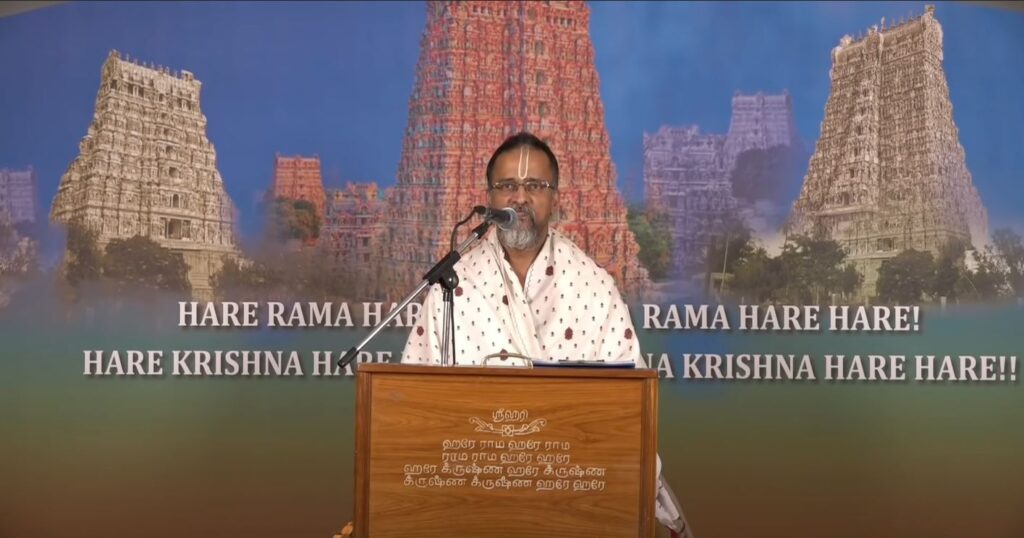The Pandavas were very pious, brave, lived a righteous life and were adored by all. Above all they were ardent devotees of Lord Sri Krishna, who was their cousin, and hence had Him on their side. The Kauravas, who lacked all these qualities, envied the Pandavas and never wanted to let go of the throne of Hastinapura which was then ruled by their blind father, Dhritharashtra.
 When Dhritharashtra gave half the kingdom to the Pandavas, they built a stunning capital, Indraprastha. Duryodhana and the other Kauravas visited Indraprastha and were amazed by its richness and architectural beauty. There was especially one palace of illusions that had been designed by Mayasura, the architect of the netherworld. So skillful was Mayasura’s artistry that, where there was no water the floors gave the impression of water pools, and where there was water it looked like a decorative floor. When Duryodhana took a tour of this palace, he was fooled more than once by its illusions. When he fell awkwardly into a pool of water assuming it to be solid floor, Draupadi could not contain herself and let out peals of laughter that rang through the palace, adding insult to Duryodhana’s injury. Enraged, Duryodhana left Indraprastha ignoring all entreaties of Yudhisthira.
When Dhritharashtra gave half the kingdom to the Pandavas, they built a stunning capital, Indraprastha. Duryodhana and the other Kauravas visited Indraprastha and were amazed by its richness and architectural beauty. There was especially one palace of illusions that had been designed by Mayasura, the architect of the netherworld. So skillful was Mayasura’s artistry that, where there was no water the floors gave the impression of water pools, and where there was water it looked like a decorative floor. When Duryodhana took a tour of this palace, he was fooled more than once by its illusions. When he fell awkwardly into a pool of water assuming it to be solid floor, Draupadi could not contain herself and let out peals of laughter that rang through the palace, adding insult to Duryodhana’s injury. Enraged, Duryodhana left Indraprastha ignoring all entreaties of Yudhisthira.
Once in Hastinapura, Duryodhana and his uncle Shakuni hatched a plan and decided to invite the Pandavas for the game of dice. Despite knowing Duryodhana’s deceitfulness, Yudhisthira decided to go.
Yudhisthira began losing right from the beginning. He lost his jewels, wealth and all possessions. Then he lost his part of the kingdom, himself and his brothers too. Then Shakuni instigated him into putting Draupadi at stake, and Yudhisthira fell into the trap. He lost Draupadi too. The Kauravas brought Draupadi to the hall and tried to humiliate her. However, she cried out to Krishna at the final moment and He saved her from disgrace. In the end, the Pandavas played and lost one final game as a result of which they were sent to exile for 12 years followed by one year of hiding.
When the Pandavas successfully completed their exile, they returned and were forced to wage a war to get back their share of the kingdom.
Lord Krishna, as always was on the Pandavas’ side, and although He had vowed not to take up arms in the battle, He decided to be Arjuna’s charioteer.
However, on the battlefield just before the start of the war, as the two armies stood ready to plunge at each other, Arjuna broke down. He saw that he had to fight his own uncles, teachers and cousins., and suddenly felt the pointlessness of war. He cried to Krishna that he did not want the kingdom at the cost of the lives of his relatives and friends.
It was then that Lord Sri Krishna rose up and delivered—not only to his best friend but to the entire world—the greatest of his discourses: the Bhagavad Gita.
Responding to Arjuna’s confusion and moral dilemma about fighting his own cousins, Lord Krishna explained to Arjuna his duties as a warrior and prince. He also used this opportunity to elaborate, with examples and analogies, on the different paths to reach Himself, the Supreme Lord. At the end of the discourse, Arjuna’s confusion about fighting his cousins was cleared, but a new confusion took its place. Having listened to the Lord speak, in intricate detail, about various philosophies and the paths to reach Him, Arjuna was now confused about what he should really do to attain Him. When he asked Krishna what he should really do, Lord Krishna smiled and revealed His greatest secret. He says, “Simply surrender to Me and I will take care of you.”
Yaamini ZivanPrakash, Chicago, IL






